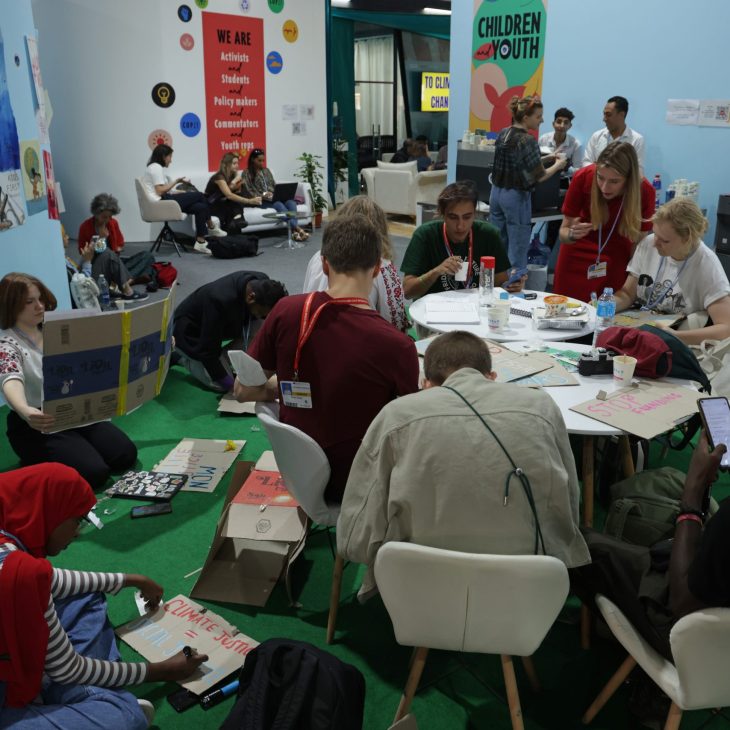Don’t Overlook the Faith in Climate Action
March 7, 2023

(RNS) — In the midst of this unseasonably warm winter, I found myself repeating an easy joke during small talk before meetings. “Summer in February feels amazing — so long as you don’t think about why.”
People laughed politely. I smiled, too. Dad jokes are an important part of my identity.
Over the past few weeks, this joke hasn’t felt funny to me anymore. Perhaps it was never funny in the first place.
Here’s the thing about humor rooted in social issues. So often, it lands because of the truth underneath it, a truth we all know but don’t always acknowledge. In this case, I see two truths that we tend to downplay and overlook.
The first truth is that the climate crisis poses a real threat to our well-being. The second truth is that ignorance is bliss.
There’s another reality we can acknowledge: Pretending our problems don’t exist might help us relax in the moment, but it comes with a real cost in the long run. It’s better to be clear-eyed and honest and to take on the challenges that come our way.
Caring for our environment is something we can all gather around. Our species has been destroying one of the most precious gifts we’ve been given. Our behavior has a particularly detrimental impact for the most vulnerable among us.
Some might ask what faith has to do with the conversation on climate justice. But I feel moved to ask a parallel question: What’s more faithful than caring for ourselves and for one another?
Recent data from the Pew Research Center confirms what we already know: Highly religious Americans are less likely to express concern about the warming environment, and climate change is often a taboo issue.
These perspectives do not come as a surprise to those of us who have been paying attention to the conversation on climate. In many ways, religious communities and perspectives are a barrier to climate action.
However, there is some positive movement and opportunity in this regard, too. Pew’s data shows that most religious Americans also feel a sense of stewardship toward our environment and consider the Earth as sacred.
This information might come as a surprise to some, especially when we look at behaviors. But it helps us understand some of the trends in the world of climate justice. For instance, we are now seeing people of faith leverage their faith traditions to drive action.
More and more organizations are emerging — such as Young Evangelicals for Climate Action, Green Muslims and Dayenu — to address climate change in a way we haven’t seen previously. These are people and communities of faith drawing from their own religious and spiritual traditions to engage in climate action.
In some ways, the issue of climate change, and how we come together to solve it, mirrors our rising polarization. It requires that we show up as a collective to have honest, respectful dialogue with those who may see things differently than we do and that we work together to find a solution. It also requires a lot of hard work behind the scenes and collaboration among many dedicated communities.
Collective engagement on climate change also means that we must look beyond our individual needs and comforts. We may not be around to see the payoff of our work, because change can take decades — and in a culture of instant gratification, that might feel unsatisfying. How do we appreciate that the winters stay cold? How do we value limiting sea level rise? Will we celebrate the incremental moments of progress, and will that be enough?
In the climate crisis, we can see the echoes of how faith communities have come together to advance social change in the past. As leaders gather for the United Nations Climate Change Conference later this year, our leaders would be wise to see how religion and religious actors can also be part of the solution.
This week, leaders on climate action are gathering in Miami for Aspen Ideas Climate with the goal of exploring bold, audacious new ideas about the climate crisis. I plan to attend, and I have an agenda. As we bring forward new, innovative solutions to the climate crisis, let’s also remember the significant role faith can play in motivating individuals, groups and societies to pursue change. The reality is that most religious Americans care about the environment and see it as sacred. The challenge before us is clear: How do we channel this belief into sustained action, so that we may all benefit, now and into the future?
Share
Related Articles
American Civic Life
Is This a Time for Bridgebuilding? 5 Leaders in Conversation
Higher Education
What Does Interfaith Engagement Mean from an Evangelical Perspective?
American Civic Life
Faith Based Efforts Work in Vaccine Uptake: Now Let’s Make it Easy



